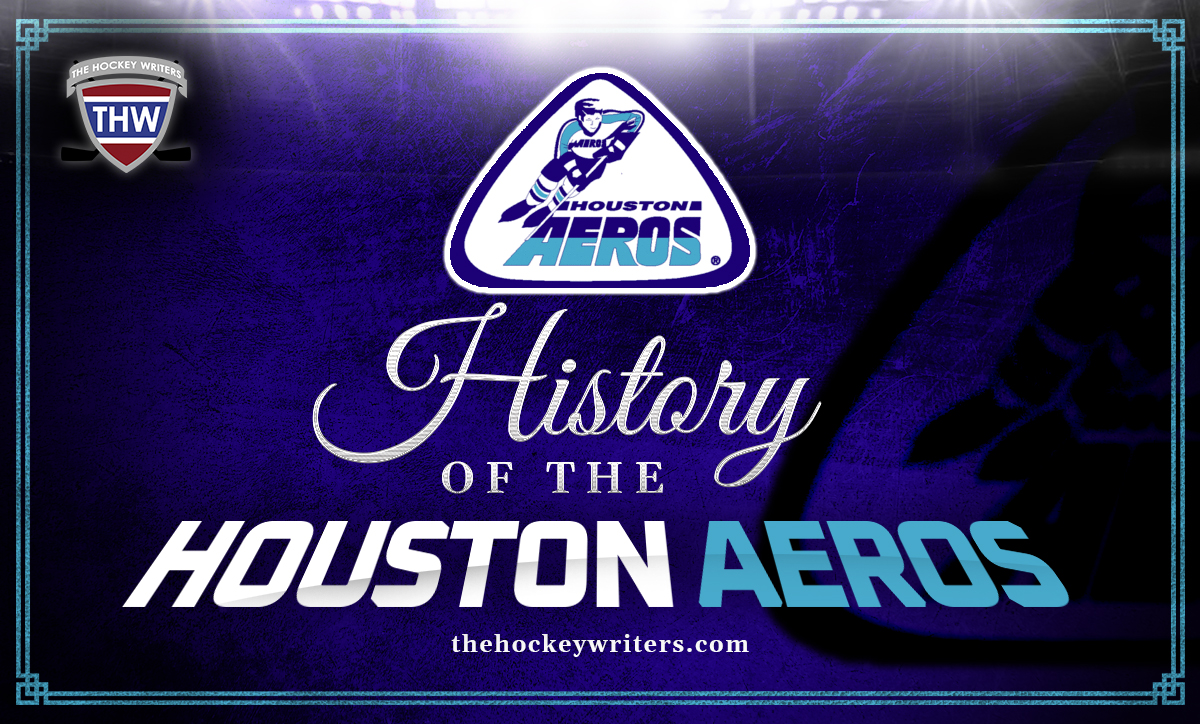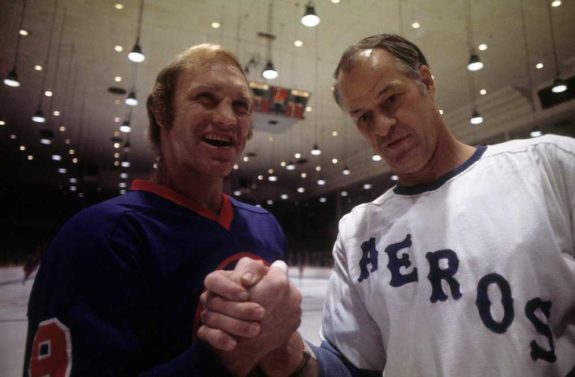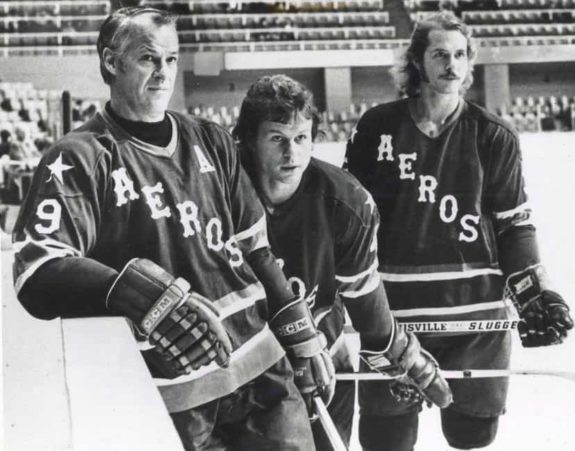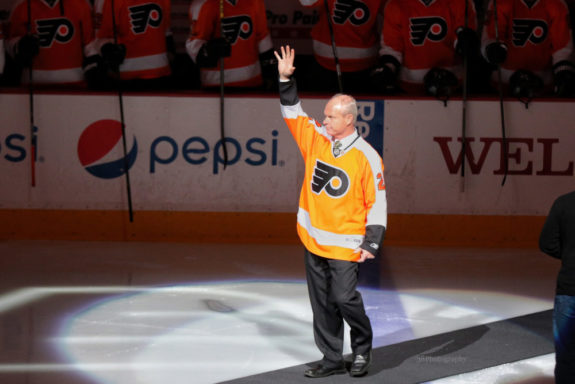The Houston Aeros were a member of the now-defunct World Hockey Association (WHA) from 1972-78. They were highly successful, making the playoffs each of their six seasons and won two league championships in three final appearances. The Aeros were the first major professional hockey team in Texas and became one of the state’s most successful sports franchises.

Houston Aeros – Questionable Beginnings
The Aeros may have developed into one of the most successful franchises in WHA history, but the franchise’s start was quite murky. Although the team only called the city of Houston home, its origins were rooted 1,100 miles northeast in Dayton, Ohio. There, in 1971, architect Paul Deneau purchased the rights to a franchise for $25,000 as a charter member of the league. They were called the Dayton Arrows.
Sign up for our NHL History Substack newsletter
Inability to find a suitable venue in Dayton caused Deneau to seek a home elsewhere, finally choosing Houston. The name was changed to Aeros after he spotted an AeroMexico plane while traveling and recognized the city’s connection to the aerospace industry. Upon relocation, the team played its home games in the Sam Houston Coliseum until 1975 when The Summit was completed.
Leadership Decisions
Regarded as a major reason for Houston’s success, Deneau chose to hire former player Bill Dineen as head coach with significant control of personnel decisions. Dineen played parts of five seasons with the Detroit Red Wings and won two Stanley Cups with the team, fostering a connection that would help bring Gordie Howe to Houston.
After being hired by the Aeros, Dineen used his experience in the Western Hockey League (not to be confused with the current Canadian Hockey League division) to land veterans. Forwards Ted Taylor, Larry Lund, and Frank Hughes, defensemen Poul Popiel, Larry Hale, and John Schella, and goaltender Wayne Rutledge were members of the inaugural roster and remained until the franchise folded.
Dineen was the only head coach and general manager in Aeros history and led the team to a 285-170-19 record over six seasons. Following the teardown of the franchise, he coached the New England Whalers of the WHA for one season before being hired by the Adirondack Red Wings of the AHL, where he coached for six seasons. He wrapped up his coaching career with two seasons as head coach of the Philadelphia Flyers before he was fired after the 1992-93 season.
Season Results
Houston’s inaugural season aligned with the WHA’s inaugural season in 1972-73. They finished with a 39-35-4 record, good enough for second place in the western division. They reached the playoffs and defeated the Los Angeles Sharks in the first round but were swept in the second round by a Winnipeg Jets team led by Bobby Hull.

The 1973-74 season was the year the Aeros took off as a team. They won their division with a 48-25-5 record and swept the Chicago Cougars to win their first Avco Cup as league champion. It was their first of three consecutive final appearances. That season also marked the arrival of Gordie Howe and his sons, Marty and Mark, and all three were key to the success of the team. But more on the Howe trio in a bit.
The Aeros’ third season, 1974-75, was the team’s most successful, finishing with a 53-25-0 record and won their second Avco Cup, defeating the Quebec Nordiques. That season also marked the first inter-league game when the Aeros played the NHL’s St. Louis Blues on September 26, 1974. Houston won, 5-3.
The final three seasons for the Aeros, 1975-78, were a period of slow decline in team performance. They returned to the Avco Cup final in 1975-76 but lost to Winnipeg in four games. The next two seasons, the Aeros qualified for the playoffs, but were ousted in the division finals in 1977 and in the first round in 1978, their final year.
“Welcome to Howeston”
According to Gordie Howe’s autobiography, Mr. Hockey, the above phrase was displayed on a banner in downtown Houston prior to the 1973-74 home opener. It was printed after the Aeros signed NHL legend, Gordie, and his sons, Marty and Mark. By 1973, Gordie had been retired from playing for two seasons and was the NHL’s all-time leader in games played, goals, assists, and points. Upon retirement, he took a front office position with the Red Wings but sought a return to the ice.

The Howe family’s connection with the Aeros started after the team took Mark with their first-round pick and Marty in the 12th round. Both selections were considered controversial at the time because the WHA disregarded the NHL’s rule to not draft junior-eligible players. By drafting the two Howe sons, Houston presented the brothers with the choice of staying in juniors or leaving and playing professional hockey. The decision was made even more difficult when NHL president Clarence Campbell called Gordie, telling him to forbid his sons from signing with the Aeros. Instead, Gordie allowed Mark and Marty to make their own decisions and, in turn, they signed with Houston.
“The NHL’s president spoke to me at length abut the ramifications of our boys playing for the Aeros. It would be a heavy blow to the league, he said, as well as something that would potentially jeopardize the entire system of junior hockey…In the end, our decision came down to doing what we thought was best for our boys. I called Mr. Campbell back the next day and told him I couldn’t ask Mark and Marty to deny themselves an opportunity they’d worked so hard to earn.” Mr. Hockey, pages 197-98
Gordie’s path to Houston was sparked out of his desire to return to the game as a player rather than in a front office role. He contacted Aeros head coach and former teammate Bill Dineen and asked if there would be interest in having three Howes on the team. Naturally, Dineen agreed to this and a great relationship was started.
Houston’s best years coincided with the Howes on the roster. From 1973-74 to 1976-77, the Aeros won two Avco Cups in three final appearances and had a record of 204-101-11. Gordie posted 369 points in 285 games, Mark accumulated 306 points in 279 games, and Marty had 140 points in 308 games. These totals came with Gordie moving to center from right wing to make the most of Mark’s abilities on the wing.
Following the 1976-77 season, with financial issues looming for the franchise, the Howes left Houston for the New England Whalers, also of the WHA. Although the Howes tenure with the Aeros may have ended somewhat prematurely, Gordie always looked back on his time in Houston with fondness:
“When I look back at our team in Houston, I still think it was a heck of a squad. Our defense was definitely NHL caliber…I stand by the belief that the Aeros would have been among the top six or eight clubs in the NHL if given the chance. What we might have lacked in talent, we made up for in chemistry…The early years in Houston with Marty and Mark were some of the most fun I’d ever had playing hockey. It made my comeback decision feel like a no-brainer.” Mr. Hockey, pages 214-15
Downfall of the Franchise
Like many WHA franchises, the Houston Aeros had an unsustainable financial plan. From its start, the WHA attracted players with contracts NHL teams couldn’t match. The issue is that the WHA didn’t have the income potential of the NHL and many of its franchises were in financial turmoil from the start.
The Aeros, for instance, went through three ownership groups in the franchise’s six years of existence. Following the 1977-78 season, their last, the team’s ownership group sought a merge with the NHL like the Winnipeg Jets, Edmonton Oilers, Quebec Nordiques, and New England (Hartford) Whalers did. Simultaneously, an effort was made to bring the Colorado Rockies to Houston but they ultimately relocated to New Jersey and became the Devils. After that plan fell through, the team was placed for sale but no owner could be found. The franchise finally ceased operations in July 1978 with 15 contracts sold to the Jets and the rest released as free agents.
After the collapse of the Houston Aeros, many of their players had success for other WHA teams or in the NHL. John Tonelli played 16 seasons in the NHL, winning four Stanley Cups with the Islanders. Terry Ruskowski played one season with the Winnipeg Jets before making the jump to the NHL where he spent 11 seasons.
Gordie Howe played two seasons with the New England Whalers and made the transition with the team to the NHL, spending one season in Hartford. Mark played 16 seasons in the NHL, the majority with the Philadelphia Flyers and was elected to the Hockey Hall of Fame in 2011.

Hockey in Houston Post-Aeros
Since the folding of the Aeros franchise in 1978, no major hockey franchise has called Houston home. The city was in the running for an expansion franchise in 1997 but Columbus was awarded the Blue Jackets instead. The Aeros team name was re-used in the now-defunct International Hockey League from 1994-2001 and was absorbed into the American Hockey League as an affiliate of the Minnesota Wild. This version of the Houston Aeros remained until the team relocated to Iowa in 2013 and became the Iowa Wild.
There continues to be a desire among Houstonians to get an NHL franchise, either through relocation or expansion. Currently, the city appears to be a finalist along with Seattle to be awarded the league’s 32nd franchise. Until then, the city will have to look back upon the 1970s with reverence when Houston was atop the hockey world.
Bonus Content
This is a great interview Gordie Howe did with the CBC in 1978 discussing his return to hockey following a two-year absence.
* originally published in Dec. 2017
